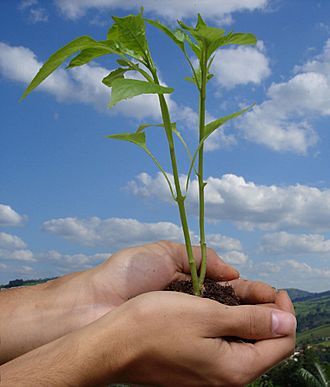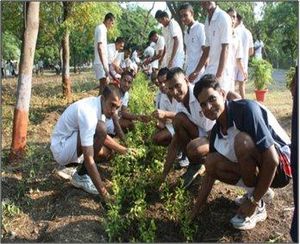World Environment Day facts for kids
World Environment Day, also known as WED, is a special day celebrated every year on June 5th. Its goal is to encourage people all over the world to learn about our planet and take action to protect it.
The United Nations (an organization of countries that work together for peace and cooperation) supports this day. It is a time for everyone, including governments, companies, and regular people, to focus on helping the environment.
First held in 1973, World Environment Day has become a huge global event. It helps raise awareness about important environmental problems like ocean pollution, global warming, and protecting endangered animals. Over 143 countries take part in this important day each year.
Contents
- How Did It All Start?
- A New Theme Every Year
- 2013: Think.Eat.Save
- 2014: Raise Your Voice, Not the Sea Level
- 2015: Seven Billion Dreams. One Planet. Consume with Care
- 2016: Go Wild for Life
- 2017: Connecting People to Nature
- 2018: Beat Plastic Pollution
- 2019: Beat Air Pollution
- 2020: Time for Nature
- 2021: Ecosystem Restoration
- 2022: Only One Earth
- 2023: Solutions to Plastic Pollution
- 2024: Land Restoration, Desertification and Drought Resilience
- Host Cities and Themes
- Images for kids
- See also
How Did It All Start?
World Environment Day was created in 1972 by the United Nations. This happened at a big meeting in Stockholm, Sweden, called the Conference on the Human Environment. At this conference, leaders from around the world discussed how people's actions affect the planet.
A year later, in 1973, the very first World Environment Day was celebrated. The theme was simple but powerful: "Only One Earth." This reminded everyone that we all share one planet and must take care of it.
A New Theme Every Year
Each year, World Environment Day has a different theme and a "host country" that leads the main celebrations. The theme helps focus everyone's attention on a specific environmental issue. Here are some of the themes from recent years.
2013: Think.Eat.Save
The theme for 2013 was "Think.Eat.Save." The goal was to make people think about food waste. A lot of food is thrown away every year, which is bad for the environment. The campaign encouraged people to be more mindful about the food they buy and eat. The host country was Mongolia.
2014: Raise Your Voice, Not the Sea Level
In 2014, the theme focused on small island nations and the danger of rising sea levels caused by global warming. The slogan, "Raise your voice, not the sea level," was a call to action to fight climate change. Barbados, a small island country, hosted the event.
2015: Seven Billion Dreams. One Planet. Consume with Care
The 2015 slogan was "Seven Billion Dreams. One Planet. Consume with Care." It reminded us that with so many people on Earth, we need to use resources wisely. Italy hosted the celebrations this year.
2016: Go Wild for Life
The 2016 theme, "Go wild for life," was all about stopping the illegal trade of wildlife. This trade harms many animal species. Angola was the host country for this important theme.
2017: Connecting People to Nature
In 2017, the theme was "Connecting People to Nature." It encouraged everyone to get outside and appreciate the beauty of the natural world. Canada was the host nation.
2018: Beat Plastic Pollution
The theme for 2018 was "Beat Plastic Pollution." This was a call to reduce our use of single-use plastics, like straws and bags, which harm our oceans and wildlife. India, the host country, promised to ban all single-use plastics by 2022.
2019: Beat Air Pollution
In 2019, the focus was on "Beat Air Pollution," a serious problem that affects the health of millions of people. China hosted the events for this year.
2020: Time for Nature
The theme for 2020 was "Time for Nature." It was a reminder of how important biodiversity (the variety of life on Earth) is for our survival. Colombia, a country with an amazing amount of different plants and animals, was the host.
2021: Ecosystem Restoration
In 2021, the theme was "Ecosystem Restoration," which means helping to heal and repair our damaged planet. This could mean planting trees, cleaning up rivers, or rewilding areas. Pakistan hosted the event.
2022: Only One Earth
For its 50th anniversary, the 2022 theme was "Only One Earth," the same as the very first World Environment Day. It was a powerful reminder that we need to protect our planet for future generations. Sweden, where the first conference was held, was the host.
2023: Solutions to Plastic Pollution
The 2023 theme continued the fight against plastic with "Solutions to Plastic Pollution." It focused on how we can move towards a "circular economy," where we reuse and recycle materials instead of throwing them away. The Ivory Coast was the host country.
2024: Land Restoration, Desertification and Drought Resilience
In 2024, the theme focused on healing our land. It highlighted the problems of desertification (where land becomes desert) and drought (long periods with no rain). The host country was Saudi Arabia.
Host Cities and Themes
Every year, a different city hosts the main events for World Environment Day. Here is a list of the hosts and themes from the last several years.
| Year | Theme | Host city |
|---|---|---|
| 2013 | Think.Eat.Save. Reduce Your Foodprint | Ulaanbaatar, Mongolia |
| 2014 | Raise your voice, not the sea level | Bridgetown, Barbados |
| 2015 | Seven Billion Dreams. One Planet. Consume with Care. | Rome, Italy |
| 2016 | Zero Tolerance for the Illegal Wildlife trade | Luanda, Angola |
| 2017 | Connecting People to Nature – in the city and on the land, from the poles to the equator | Ottawa, Canada |
| 2018 | Beat Plastic Pollution | New Delhi, India |
| 2019 | Beat Air Pollution | China |
| 2020 | Time for Nature | Colombia |
| 2021 | Ecosystem restoration | Pakistan |
| 2022 | Only One Earth | Sweden |
| 2023 | Solutions to Plastic Pollution | Ivory Coast |
| 2024 | Land restoration, desertification and drought resilience | Riyadh, Saudi Arabia |
| 2025 | Ending plastic pollution | South Korea |
Images for kids
See also
 In Spanish: Día Mundial del Medio Ambiente para niños
In Spanish: Día Mundial del Medio Ambiente para niños
- Arbor Day
- Earth Day
- Index of environmental articles
- List of environmental dates
- United Nations Conference on the Human Environment
 | James Van Der Zee |
 | Alma Thomas |
 | Ellis Wilson |
 | Margaret Taylor-Burroughs |










